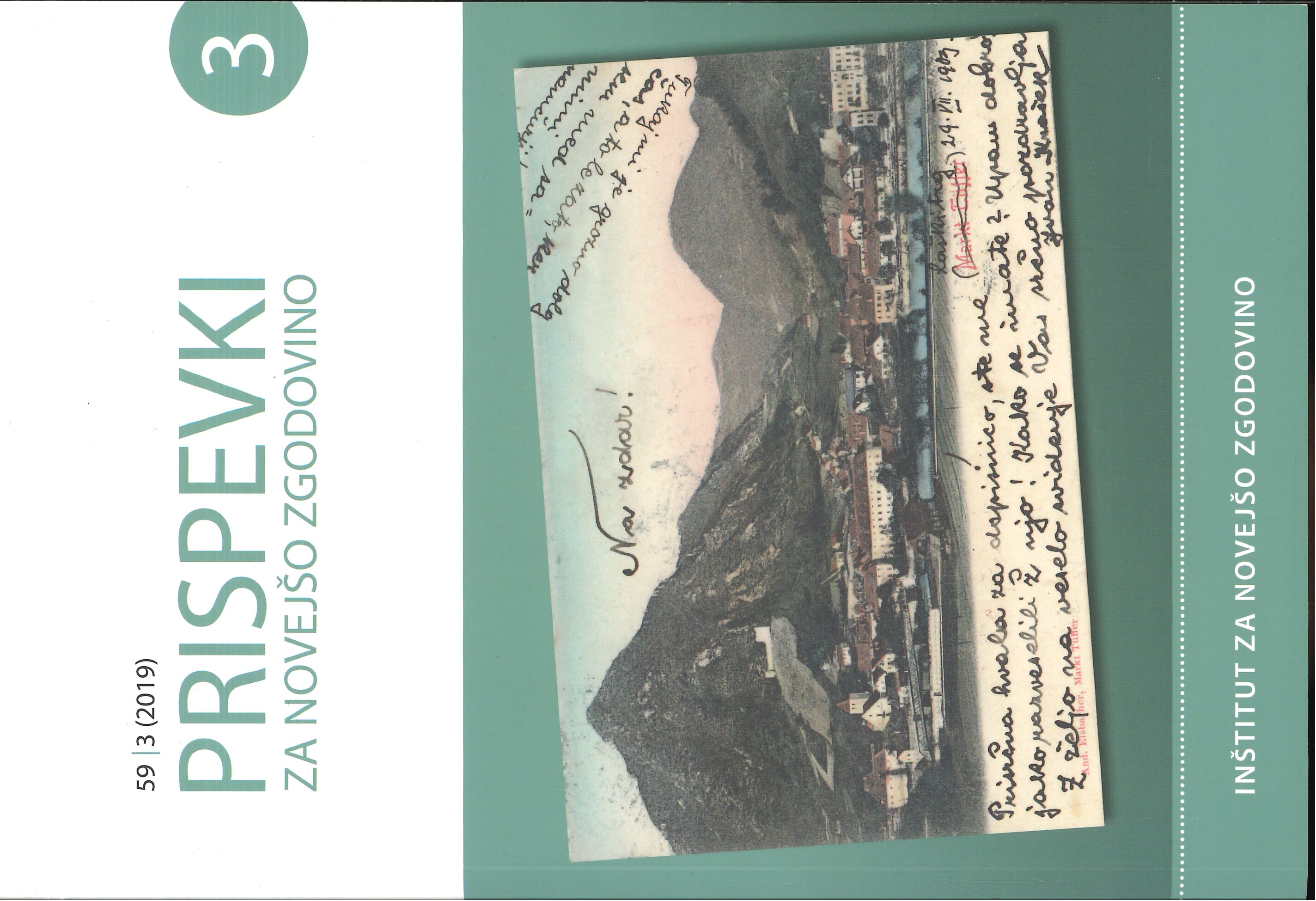Iredentistične akcije Slovenske organizacije jugoslovanskih nacionalistov (ORJUNE) v Italiji in Avstriji (1922–1930)
DOI:
https://doi.org/10.51663/pnz.59.3.02Ključne besede:
Orjunavit Slovenija, Organizacija jugoslovanskih nacionalistov, Trst, Istra, Koroška, Fantovska zveza, Marko KranjecPovzetek
V prispevku so na podlagi razpoložljivega gradiva iz Arhiva Republike Slovenije, Hrvaškega državnega arhiva ter strateških načrtov in projektov, objavljenih v tiskovinah Organizacije jugoslovanskih nacionalistov (Orjune), predstavljena idejna načela, na katerih so temeljili ekspanzionistični načrti te organizacije. Posebna pozornost je posvečena iredentističnim akcijam, ki jih je slovenska veje Orjune opravila na ozemlju Italije (Trst, Gorica in Istra) in Avstrije (Koroška). Podrobno so opisana tudi idejna načela in metode dela organizacij Orjunavit (Organizacija jugoslovanskih nacionalistov v Italiji) in Fantovska zveza, ki sta Orjuni služili kot orodje za delovanje na ozemlju Italije in Avstrije. Ekspanzionistične ideje, ki so bile del Orjuninega ideološkega konstrukta in so se manifestirale z iredentističnimi akcijami na ozemlju sosednjih držav, so bile globoko ukoreninjene v temeljnih ideoloških načelih tega gibanja in posebnih zgodovinskih okoliščinah, v katerih je nastalo. Orjunini ideologi so svoje ekspanzionistične načrte o ustanovitvi Velike Jugoslavije, ki bi segala od Varne do Trsta in od Szegeda do Soluna, predstavljali kot boj za ustanovitev enotnega in celovitega etničnega telesa Južnih Slovanov. Vodstvo Orjune je na podlagi imperativa ohranitve etnične identitete slovenskega prebivalstva v obmejnih italijanskih in avstrijskih pokrajinah zagovarjalo sistematično uporabo organiziranega nasilja kot osnovnega orodja v boju za uresničitev svojih ciljev. Zmerna in legitimno usmerjena uradna zunanja politika jugoslovanskih oblasti ter oboroženi odpor uradnih varnostnih sil in paravojaških organizacij Italije in Avstrije sta vodstvu Orjune preprečila, da bi s terorizmom doseglo svoje zunanjepolitične cilje. Po drugi strani pa so se ekspanzionistične ideje, ki so bile ena od glavnih značilnosti ideologije Orjune, v medvojnem obdobju ohranile kot del idejnih konceptov vseh skrajnih desničarskih gibanj za jugoslovanski integralizem, ki so z manjšimi ali večjimi spremembami sprejela idejne konstrukte Organizacije jugoslovanskih nacionalistov.
Literatura
Bartulović, Niko. Od revolucionarne omladine do ORJUNE: Istorijat jugoslovenskog omladinskog pokreta. Split: ORJUNA, 1925.
Bosworth, J.R.B. Mussolini’s Italy: Life under the Dictatorship 19151945. London: Penguin Books, 2006.
Čop, Robert. "ORJUNA prototip političke organizacije." Graduation thesis defended at the Faculty of Social Sciences in Ljubljana, 2006.
Djordjević, Mladen. “Organizacija jugoslovenskih nacionalista (ORJUNA).” NSPM, Vol. XII, No. 1-4 (2006).
Ekmečić, Milorad. Stvaranje Jugoslavije 1790-1918 II. Belgrade: Prosveta, 1989.
Ferenc, Tone, Kacin-Wohinz, Milica in Tone Zorn. Slovenci v zamejstvu: Pregled zgodovine 1918-1945. Ljubljana: Državna založba Slovenije, 1974.
Filipič, France. „Nekaterne značilnosti delavskega revolucionarnega gibanja v Mariboru in njegovem zaleđu v letih 1921–1925.“ Revolucionarno delavsko gibanje v Sloveniji v letih 1921-1924: Referati z znanstvenega posvetovanja v Ljubljani 6. in 7. junija 1974, 151-173. Ljubljana, 1975.
Gligorijević, Branislav. „Organizacija jugoslovenskih nacionalista (Orjuna).“ Istorija XX veka: zbornik radova (1962).
Gligorijević, Branislav. „Politički pokreti i grupe sa nacionalsocijalističkom ideologijom i njihova fuzija u Ljotićevom Zboru.“ Istorijski glasnik, No. 4 (1965).
Gligorijević, Branislav. Kralj Aleksandar Karadjordjević: Srpsko-hrvatski spor. Belgrade: Zavod za udzbenike i nastavna sredstva, 2002.
Grisogono, Prvislav. Savremena nacionalna pitanja. Split: ORJUNA, 1923.
Kacin-Wohinz, Milica. Narodnoobrambno gibanje primorskih Slovencev v letih 1921-1928 II. Koper: Lipa; Trst: Založništvo tržaškega tiska, 1977.
Kacin-Wohinz, Milica. „Slovenci i Hrvati pod fašističkom Italijom.“Jugoslovenski istorijski časopis, No. 3 (1987).
Kacin-Wohinz, Milica. Prvi antifašizem v Evropi. Koper: Lipa, 1990.
Mlakar, Boris. „Radical Nationalism and Fascist Elements in Political Movements in Slovenia Between the Two World Wars.“ Slovene studies, No. 1 (2009).
Mlakar, Boris. „Zaton Organizacije jugoslovanskih nacionalistov - Orjune pod budnim očesom italjanskih fašističnih oblasti.“ Prispevki za novejšo zgodovino, No. 2
Payne, Stanley G. A History of Fascism 1914-1945. Wisconsin: University of Wisconsin Press, 2003.
Perovšek, Jurij. V zaželjeni deželi: slovenska izkušnja s Kraljevino SHS/Jugoslavijo 1918-1941. Ljubljana: Inštitut za novejšo zgodovino, 2009.
Vodušek Starič, Jerca. Slovenski špijoni in SOE 1936-1942. Ljubljana: samozal., 2002.
Objavljeno
Številka
Rubrika
Licenca
Avtorji prispevkov, objavljenih v tej reviji, soglašajo z naslednjimi pogoji glede avtorskih pravic:
- Avtorji ohranijo avtorske pravice, reviji pa odobrijo pravico do prve objave. Delo se hkrati zaščiti z licenco za prosto uporabo avtorskih del (Creative Commons Attribution License), ki drugim osebam omogoča deljenje dela ob priznanju avtorstva in prve objave v tej reviji.
- Avtorji lahko sklenejo ločene dodatne pogodbene dogovore za neizključno distribucijo različice dela, objavljene v reviji, (npr. oddaja v institucionalni repozitorij ali objava v knjigi) z navedbo, da je bilo delo prvič objavljeno v tej reviji.
- Pred postopkom pošiljanja in med njim lahko avtorji delo objavijo v spletu (npr. v institucionalnih repozitorijih ali na svoji spletnih strani), k čemer jih tudi spodbujamo, saj lahko to prispeva k plodnim izmenjavam ter hitrejšemu in obsežnejšemu navajanju objavljenega dela (glej The Effect of Open Access).


